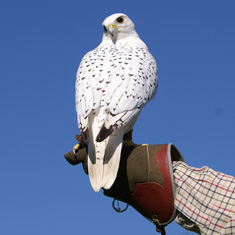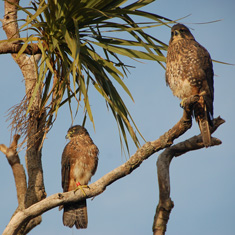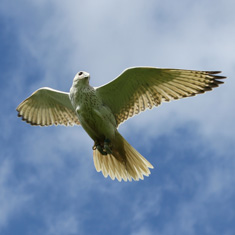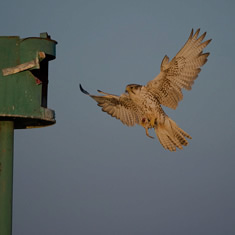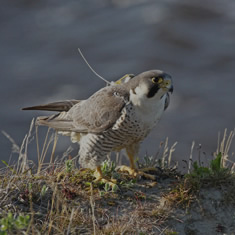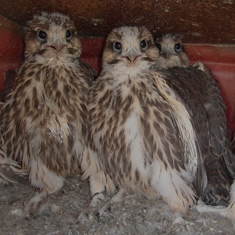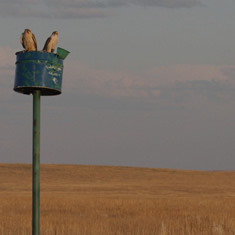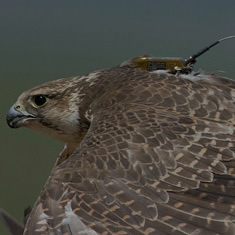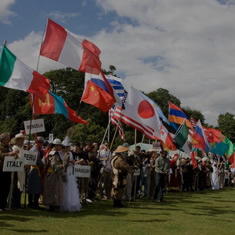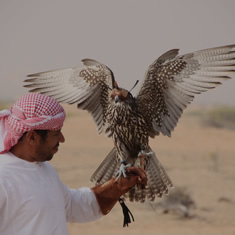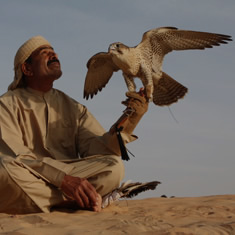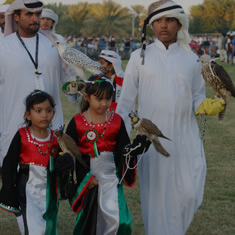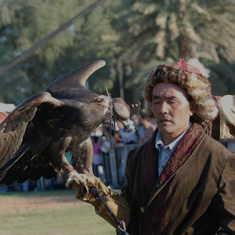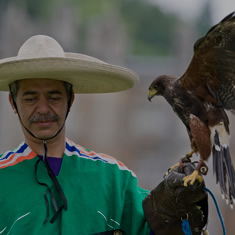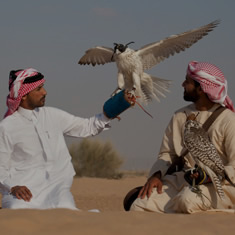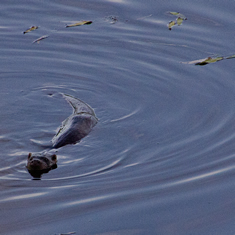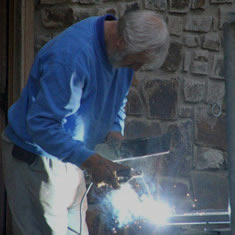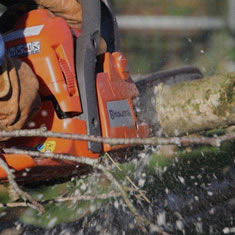- Terms and Conditions
Terms and conditions of buying a falcon
All falcon sales are arranged directly with IWC and not through the services of any agent
- UK Clients
1.1 Falcon Health
International Wildlife Consultants will only sell healthy birds that are free from signs of infectious and contagious diseases.
We recommend that the bird is examined by a recognised avian veterinarian within 7 days of purchase. In the UK a list of Royal College of Veterinary Surgeons approved avian specialists is available at the British Veterinary Zoological Society website [http://www.bvzs.org/ see: http://www.bvzs.org/specialists]
Birds sold in the UK can be returned within 7 days of purchase for a full refund of the purchase price if they have a medical condition that has been diagnosed by a recognised avian Veterinary Surgeon. If you wish to return the bird because of a health problem then International Wildlife Consultants will require the following:
a) Authority to contact the avian Veterinary Surgeon for a report on the case.
b) Copies of the clinical records (including copies of radiographs, endoscopy images and laboratory results) for review International Wildlife Consultants.
c) Return of the bird to International Wildlife Consultant within 7 days of it leaving our facility.
Note: IWC does not supply any medicines to clients for falcons that we sell.
1.2 Falcon Transportation
Clients purchasing falcons must arrange to collect the falcons themselves. We will not release falcons to couriers. Clients must ensure that they come with adequate transport boxes. We will not release falcons if we consider the boxes bought by the client are unsuitable. IWC can supply suitable adapted pet carrier boxes for the additional cost of £30.
Falcons are very sensitive to temperature variations and clients should make a journey plan and ensure the birds are transported in a cool well ventilated vehicle. The ambient temperature within the vehicle should be < 20 ºC.
1.3 Falcon death during transportation or within the first week after purchase
If a falcon purchased by a client dies during transportation by the client or during the first week after purchase it is the responsibility of the purchaser to arrange for a post-mortem of the carcass. A copy of the post mortem report should be sent to IWC. If a pre-existing medical condition is diagnosed that could have reasonably caused the death of the falcon then IWC will refund the cost of the post-mortem and either offer a replacement falcon (if available) or a full refund of the purchase price. The post mortem must be conducted by a recognised avian Veterinary Surgeon or Veterinary Pathologist.
1.4 Storage of dead falcon carcass
Carcasses should be stored in the fridge at 0-4 ºC and submitted for post-mortem examination as quickly as possible. Clients should be aware that freezing carcasses can cause artefacts that can interfere with the accuracy of a diagnosis. Similarly failure to refrigerate a body will lead to decomposition. A poorly or incorrectly stored carcass may make a post-mortem meaningless and this may invalidate any claims for a replacement falcon or refund.
1.5 Veterinary services
Clients must confirm before collection of the falcon that they have registered with a specialist avian practitioner so that they are prepared to promptly deal with any health issues that might arise in their falcon.
For further information on International Wildlife Consultants see: http://www.falcons.co.uk/
2. Overseas Clients
2.1 Falcon Health
International Wildlife Consultants will only ship healthy birds that are free from signs of infectious and contagious diseases.
While we ensure that birds that leave our facility are healthy, it is possible for injury and death to occur during the long international journeys from our facility in Wales to our clients. We recommend that overseas clients insure the birds. This means that if an unfortunate accident resulting in severe injury or death of the bird occurs during transportation, then subject to a satisfactory veterinary certificate, history of the loss and full details of the transportation IWC will provide a full refund to the client.
We recommend that the bird is examined by a recognised avian veterinarian within 7 days of arriving at an international destination.
If international clients do not wish to insure their falcons then, unfortunately, IWC will not provide any reimbursements in cases of death or injury occurring during transportation.
Note: IWC does not supply any medicines to clients for falcons that we sell.
2.2 International Falcon Transportation
IWC staff work closely with our international clients to organise the logistics of shipping falcons overseas. IWC will arrange the CITES export permits, Export Health Certificates from the UK State Veterinary authorities, Veterinary inspection of the falcons, flight booking and liaison with handling agents. Clients are responsible for arranging the CITES import permits, confirming flights with airline, ensuring that any additional local import requirements are dealt with and collection of the falcons from the airport. IWC will communicate shipment logistic information to the client. It is the responsibility of the client to reply to communications promptly and to alert the IWC sales team to any potential alterations to the planned shipment date. If a shipment is cancelled or rescheduled because of poor or slow communication by the client then IWC may impose a penalty to cover any administrative and husbandry costs associated with the delay.
Falcons are transported in specially adapted pet carrier boxes that are IATA (International Air Transport Association) approved. These are fitted with carpet and are modified with ventilation holes. All falcons are transported with hoods, anklets, and tail and wing guards. For our major clients we routinely fit temperature sensors and data loggers in the transport boxes. The temperature logs are essential if you later wish to make an insurance claim, because they identify at what stage of the journey they may have been a handling issue, and who was responsible for handling at that point in the journey.
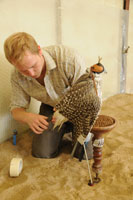 |
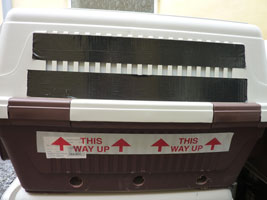 |
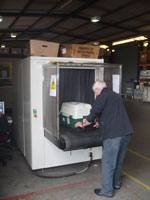 |
| Tail and wing guards being fitted to a falcon before transportation. | Standard IATA approved converted transport box. Note the large ventilation holes and the screened side grills to ensure the box has a good circulation of air and remains dark. | An IWC travel box being screened at airport security before shipment. |

